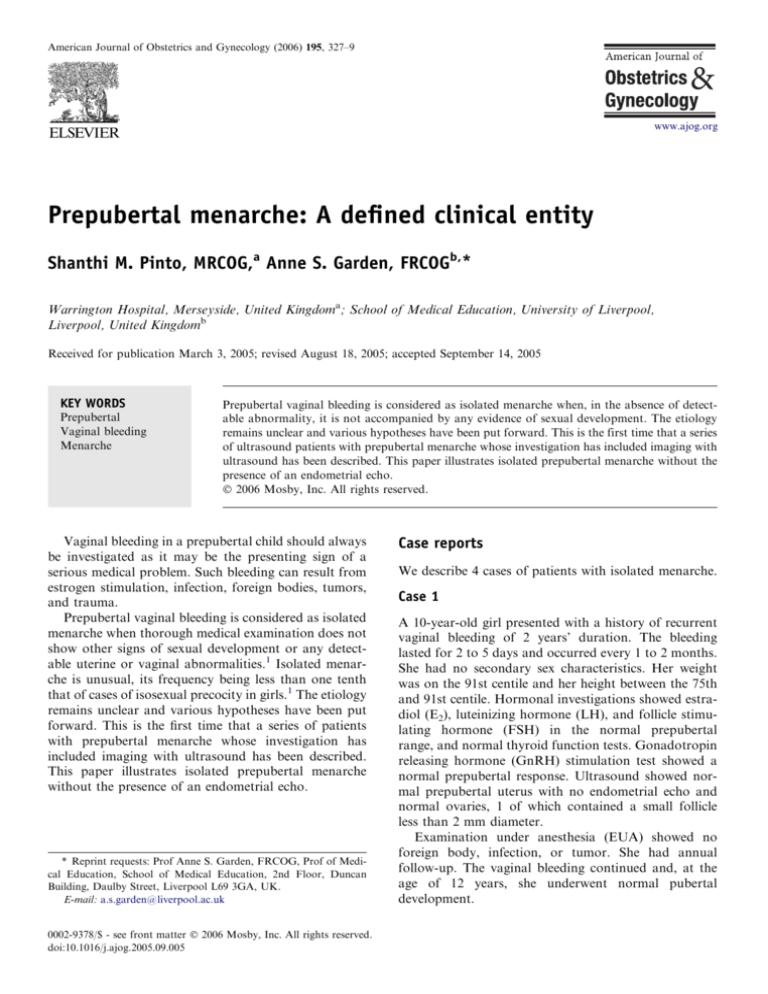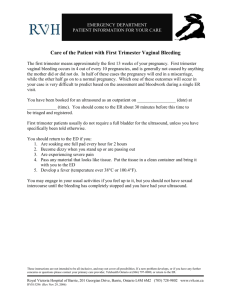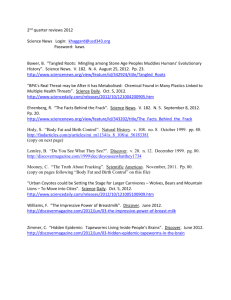
American Journal of Obstetrics and Gynecology (2006) 195, 327–9
www.ajog.org
Prepubertal menarche: A defined clinical entity
Shanthi M. Pinto, MRCOG,a Anne S. Garden, FRCOGb,*
Warrington Hospital, Merseyside, United Kingdoma; School of Medical Education, University of Liverpool,
Liverpool, United Kingdomb
Received for publication March 3, 2005; revised August 18, 2005; accepted September 14, 2005
KEY WORDS
Prepubertal
Vaginal bleeding
Menarche
Prepubertal vaginal bleeding is considered as isolated menarche when, in the absence of detectable abnormality, it is not accompanied by any evidence of sexual development. The etiology
remains unclear and various hypotheses have been put forward. This is the first time that a series
of ultrasound patients with prepubertal menarche whose investigation has included imaging with
ultrasound has been described. This paper illustrates isolated prepubertal menarche without the
presence of an endometrial echo.
Ó 2006 Mosby, Inc. All rights reserved.
Vaginal bleeding in a prepubertal child should always
be investigated as it may be the presenting sign of a
serious medical problem. Such bleeding can result from
estrogen stimulation, infection, foreign bodies, tumors,
and trauma.
Prepubertal vaginal bleeding is considered as isolated
menarche when thorough medical examination does not
show other signs of sexual development or any detectable uterine or vaginal abnormalities.1 Isolated menarche is unusual, its frequency being less than one tenth
that of cases of isosexual precocity in girls.1 The etiology
remains unclear and various hypotheses have been put
forward. This is the first time that a series of patients
with prepubertal menarche whose investigation has
included imaging with ultrasound has been described.
This paper illustrates isolated prepubertal menarche
without the presence of an endometrial echo.
* Reprint requests: Prof Anne S. Garden, FRCOG, Prof of Medical Education, School of Medical Education, 2nd Floor, Duncan
Building, Daulby Street, Liverpool L69 3GA, UK.
E-mail: a.s.garden@liverpool.ac.uk
0002-9378/$ - see front matter Ó 2006 Mosby, Inc. All rights reserved.
doi:10.1016/j.ajog.2005.09.005
Case reports
We describe 4 cases of patients with isolated menarche.
Case 1
A 10-year-old girl presented with a history of recurrent
vaginal bleeding of 2 years’ duration. The bleeding
lasted for 2 to 5 days and occurred every 1 to 2 months.
She had no secondary sex characteristics. Her weight
was on the 91st centile and her height between the 75th
and 91st centile. Hormonal investigations showed estradiol (E2), luteinizing hormone (LH), and follicle stimulating hormone (FSH) in the normal prepubertal
range, and normal thyroid function tests. Gonadotropin
releasing hormone (GnRH) stimulation test showed a
normal prepubertal response. Ultrasound showed normal prepubertal uterus with no endometrial echo and
normal ovaries, 1 of which contained a small follicle
less than 2 mm diameter.
Examination under anesthesia (EUA) showed no
foreign body, infection, or tumor. She had annual
follow-up. The vaginal bleeding continued and, at the
age of 12 years, she underwent normal pubertal
development.
328
Case 2
This 10-year-old girl had recurrent vaginal bleeding
since the age of 8. The bleeding occurred every month in
the form of spotting. She had no secondary sexual
characteristics. Her height and weight were normal for
her age. The results of hormonal investigations were
within the normal prepubertal range. Ultrasound
showed a prepubertal uterus and ovaries with no endometrial echo. EUA showed no local abnormality. She
had annual follow-up and, at the age of 11, underwent
normal pubertal development.
Case 3
This 7-year-old girl had vaginal bleeding in the form of
irregular spotting with no obvious pattern for a year
before referral. Her height and weight were appropriate
for chronologic age. The results of hormonal investigations were in the normal prepubertal range. Ultrasound
showed a normal prepubertal uterus with no endometrial echo and normal ovaries. EUA revealed no cause
for the bleeding. She had annual follow-up and was last
seen at the age of 8 years. She had normal development
with no sign of puberty. The irregular vaginal bleeding
continued.
Case 4
This 6-year-old girl had cyclical vaginal bleeding of
1 day’s duration and brown discharge. She had no
secondary sexual characteristics. Her height was on the
91st centile and weight on the 99.6 centile. GnRH
stimulation test showed a small rise in peak FSH but a
normal prepubertal LH. Estradiol levels were slightly
elevated at 59 pmol/L. On ultrasound examination,
uterine and ovarian volumes were appropriate for her
age. There was no endometrial echo. An ovarian follicle
smaller than 2 mm was present. EUA showed no local
abnormality. She had annual follow-up and was last
seen at the age of 9 years. Bleeding stopped at the age
of 7. She had normal development with no signs of
puberty.
Comment
Isolated menarche is a benign and self-limiting condition
that is not well described in gynecologic literature. It is a
relatively rare complaint but can be a source of fear or
concern for the girl and her family.
Pubertal development in girls usually follows a recognized pattern of early breast and pubic hair development, followed by the growth spurt, further breast and
hair development, with menarche being a relatively late
feature. Vaginal bleeding that occurs outside this pattern
should be investigated to rule out underlying pathology.
Abnormal vaginal bleeding in prepubertal girls may
Pinto and Garden
result from estrogen stimulation that may be endogenous from estrogen-secreting tumors or, less commonly,
exogenous, caused by ingestion of hormone tablets.
Infection, tumors of the lower genital tract, ovarian
tumors, vaginal foreign bodies, or trauma may also
cause vaginal bleeding.
In a proportion of cases with central precocious
puberty, menstrual bleeding may be the first clinical
manifestation. However, girls with central precocious
puberty usually present with acceleration in linear
growth, advancement in skeletal age, and breast development. The height and weight of 2 girls in this study
were above average. Neither of them went on to show
any other signs of pubertal development. Rarely,
isolated menarche may be the initial presentation of
the advanced sexual development relative to bone age,
which may be seen in patients with juvenile hypothyroidism. Thyroid function tests were normal in the 4
girls in this series.
Diagnosis requires careful history, complete clinical
examination, and assessment of pubertal development,
taking into account both the physical and psychosocial
factors. Pelvic ultrasound is mandatory to establish
normal anatomy and exclude tumors. Hormonal profile,
including a GnRH stimulation test, is necessary to
exclude precocious puberty. Examination under anesthesia should be carried out to exclude vaginal or
cervical lesions, foreign bodies, or infection. In the
presence of normal investigation results, annual follow-up is advisable to ensure normal pubertal development and to provide support and reassurance in what
is an extremely difficult situation for the girl and her
family to cope with.
The 4 girls described here had unexplained recurrent
vaginal bleeding, with no evidence of secondary sexual
development, and with no local causes identified. A diagnosis of isolated menarche was made.
Two girls in our series have gone on to have normal
pubertal development at an appropriate age. A followup of 9 girls in 1 series showed normal puberty and no
sign of precocious sexual activity.2 There was no acceleration of growth, bone age, or any signs of precocious
puberty in follow-up study of 2 patients.3 Twelve
women had normal menstrual cycles and were fertile
by ages 16 to 34 years after having developed isolated
menarche during childhood.4
There have been few reports in literature describing
this entity. In 1 published report, the accompanying
signs of transient breast development make a diagnosis
of transient sexual precocity more likely.1 The first report in 1979 described 4 girls with cyclical vaginal bleeding in the absence of other signs of precocious secondary
sexual development.5 Investigation showed low estrogen
levels in 2 of them, with basal gonadotrophin levels in
the upper part of the prepubertal range. No information
about ultrasound findings was given.
Pinto and Garden
In 1985, Matilde Marcia described 17 prepubertal girls
aged 1 to 8 years with isolated menarche. Eleven girls had
2 or more apparent menstrual periods, and 6 experienced
only 1 period.2 Hormonal investigation showed no increase in gonadotrophin secretion, but demonstrated elevated levels of estradiol in the early pubertal range.
Ultrasound examination was performed but no measurement of the endometrial thickness was made.
Nearly all of the hypotheses regarding the etiology of
this condition that have previously been put forward fail
to address the absence of an endometrial echo, and this
paper is the first one that illustrates this. This refutes the
suggested hypotheses of increased sensitization of endometrium to estrogens as a causative factor.
The accepted view is that isolated menarche is related
to the increased sensitivity of the endometrium to
estrogens, similar to increased breast sensitivity to
estrogens in premature thelarche.5 This, however, would
be expected to result in endometrial thickening. None of
the published series have included information about
uterine size or endometrial thickness. All the girls in
our series had ultrasound examination that showed normal prepubertal uterine size and no identifiable endometrial echo. The absence of endometrial thickening cases
does not fit in with the theory of increased sensitization
of endometrium to estrogens.
It is suggested that in isolated menarche a partial
and transient activation of the hypothalamo-pituitarygonadal axis could be present.3,6 In 1990, Saggese et al
studied gonadotrophin pulsatile secretion in 5 girls
with premature menarche.6 During sleep, 3 girls showed
LH pulses with low amplitude and a pubertal pattern of
frequency, whereas FSH increased without demonstrable episodic secretion. In these 3 girls, menstruation
ceased during the follow-up period and repeat testing
in 1 girl showed a return to an apulsatile prepubertal
LH pattern.
In our series, the hormonal investigations, including
the GnRH stimulation test, were normal. The girl
reported in case 4 showed a small rise in peak FSH
329
and slightly elevated estradiol levels, which may suggest
release of follicular estrogen, stimulating the pituitarygonadal axis. Transient activation cannot entirely explain the persistent cyclical bleeding in the other girls in
our series. This once again has not been the consistent
finding in all the cases described in literature.
Prepubertal vaginal bleeding is a relatively rare condition but can be a source of fear and concern for the
girl and her family whether it occurs as a single,
transient event or is recurrent. Psychologic and social
barriers that arise as a result of misinformation and fear
may lead, in some cases, to patient delay in seeking
medical aid.
Careful investigation is imperative to exclude underlying pathology. Long-term follow-up of these girls is
advisable, mainly for reassurance, as there is no evidence
that precocious puberty is an associated feature. Girls
and their families can be reassured that isolated menarche a defined clinical syndrome, is a benign and selflimiting condition, and that the normal onset of puberty
should be anticipated. The etiology of premature menarche remains unclear, and more research is needed to
establish causation.
References
1. Rainsford PH, Evans M. Transient sexual precocity in girls. Lancet
1954;2:559.
2. Blanco-Garcia M, Evain-Brion D, Roger M, Job J-C. Isolated menses in prepubertal girls. Pediatrics 1985;76:43-7.
3. Zarzycki J, Pawlikowska-Haddal A, Hilczer M, Domagalska-Nalewajek H. Premature menarcheda legend or a defined clinical syndrome. Endokrynol Pol 1992;43:475-9.
4. Murram D, Dewhurst J, Grant DB. Premature menarche: a follow-up study. Arch Dis Child 1983;58:142-56.
5. Heller ME, Dewhurst J, Grant DB. Premature menarche without
other evidence of precocious puberty. Arch Dis Child 1979;54:
472-5.
6. Saggese G, Ghirri P, Del Vecchio A, Papini A, Pardi D. Gonadotropin pulsatile secretion in girls with premature menarche. Horm
Res 1990;33:5-10.








